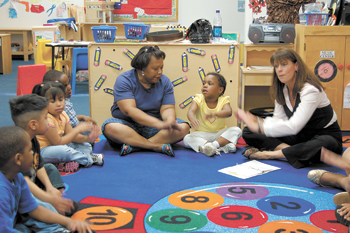In Harmony: For 15 years, Music Institute Has Served All Students Regardless of Age or Ability to Pay
This is a big year for school anniversaries for musician Mylinda Dockery. In early March, she traveled to Troy, North Carolina to celebrate the 20th anniversary of Trinity Music Academy, a non-profit community music school she helped to co-found.
Two decades after its start, it has provided music education to thousands in the community.
“It was wonderful to be a part of the celebration and see how the school has grown,” Dockery said.
This year also marks the 15th anniversary of the Music Institute of Lexington, a similar school that Dockery founded and has run ever since.
Starting as a virtual stranger in Lexington, she launched the school from the basement of her home.
In the past 15 years, she has shepherded it into a dynamic music center located at Trinity Hill United Methodist Church and Chapel Hill Presbyterian Church on Tates Creek Road.
The school has more than 750 students, taught by a professional staff of 27 instructors.
In many ways, the Music Institute is like any other music school – it offers individual and group lessons, starting with early childhood classes and embracing classical, jazz, blues and rock.
Students perform recitals, take master classes and play in competitions and music festivals.
But in one important way, the Music Institute is unique to Central Kentucky – the school offers music lessons to all students, regardless of age, race, ability or financial resources.
Currently, 50% of all students receive scholarships paid for in part by grants and fund-raising. The average at most community arts schools is 18-20%.
The school also offers music classes to students with special needs through its music therapy program.
Aided by Grants
Dockery’s commitment to serving the community is the hallmark of the school even though it placed a financial strain on the Institute at the outset.
But the Institute has received grants over the years from a variety of local and national sources, including Kentucky State Arts Council, Honorable Order of Kentucky Colonels, Toyota, Keeneland, Junior League of Lexington, W. Paul & Lucille Little Foundation, Fifth/Third Bank.
Plus, National Guild of Community Arts Education, Foundation for Music Based Learning, the National Endowment for the Arts and the Knight Foundation.
In 2001, private donors Tom and Clara Dupree of Lexington “saved the school,” according to Dockery, with their generous and continued support.
“It was a struggle in the beginning, but the school has grown so much and we’ve had so much help along the way,” Dockery said.
“Music can heal people’s souls and spirits so it’s so important to bring it to the whole community. You see so many children who just want to touch the instruments.
“Giving them opportunity touches my heartstrings. You can truly strengthen a community through the power of music.”
For economically challenged families, the Institute serves as a lifeline to music education.
“We don’t have a lot of money for private lessons,” said Tressa Rowe, who currently has four children taking violin lessons.
“With a large family, the cost would be astronomical. But because of the scholarships we’ve been able to take lessons for the past eight years.”
Comments like that gratify Dockery as does the praise from families who pay for lessons.
Melissa Karrer’s  6-year-old son Jacob has been taking guitar lessons with instructor Seith Miller for six months.
6-year-old son Jacob has been taking guitar lessons with instructor Seith Miller for six months.
“We are so pleased with what he’s been able to learn. We’re looking forward to seeing his love for music and the guitar grow in the time to come.”
Instruments Galore
Along with guitar, piano and violin, the Institute offers lessons in virtually every instrument from cello and clarinet to oboe and organ, embracing woodwinds, horns and percussion.
The school also encompasses the life span. Children as young as 6 months start in the early childhood program based on Musikgarten.
And the rapidly growing cohort of senior players includes an 84-year-old.
Emerging as one of its most popular programs is Piano for Pleasure, launched last year for those 60 and older through a grant from the MetLife Foundation.
The program started with 24 students, but this year Dockery expects more than 100 for the fall semester.
After its humble origins, the Music Institute envisions a vibrant future.
“The goals when we started were to serve the community by offering high quality music lessons for all and to serve local artists by offering a place to teach and a practice space,” Dockery said.
“The community has embraced our mission and helped to make this possible.”

